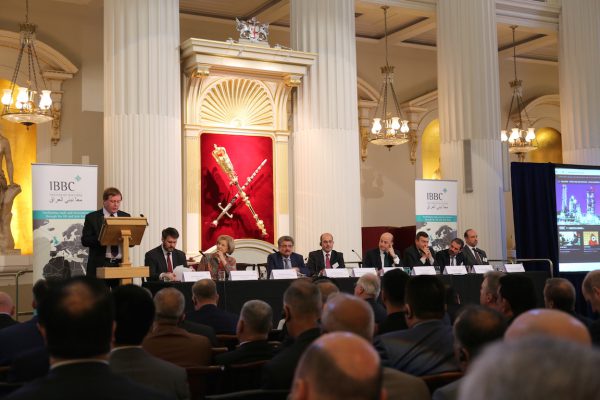The Iraq Britain Business Council (IBCC) held its Council Meeting, Dinner & Reception for IBBC Members and distinguished guests on 28 January. The Council Meeting, hosted by Baroness Nicholson of Winterbourne, President of IBBC and the Prime Minister’s Trade Envoy to Iraq, Azerbaijan, Turkmenistan and Kazakhstan took place in the House of Lords.
Ms Jwan Khioka, Minister Plenipotentiary from the Embassy of the Republic of Iraq greets IBBC Members and distinguished guests
The Council Meeting was followed by a Reception & Dinner hosted by Brigadier James Ellery CBE at the Cavalry & Guards Club, where Ms Jwan Khioka, Minister Plenipotentiary from the Embassy of the Republic of Iraq greeted more than 40 guests.
After dinner, Dr Heike Harmgart, Managing Director for the Southern and Eastern Mediterranean (SEMED) region at the European Bank for Reconstruction and Development (EBRD) elaborated EBRD’s strategy and business plan for the SEMED region, especially highlighting the business opportunities in the Republic of Iraq.
Dr Heike Harmgart, Managing Director for the Southern and Eastern Mediterranean region at the European Bank for Reconstruction and Development (EBRD), after dinner speaker
The Education, Training and Heritage Sector Table Meeting hosted by IBBC in its London offices on 28th January was attended by representatives from the UK Embassy of the Republic of Iraq, Bath Spa University, the University of Northampton, Stirling Education, UB Holdings, Unihouse Global, the British Council and the IBBC.
The meeting agreed its over-riding objective is to improve education across Iraq, build in-country capacity and facilitate cooperation between Iraq and international, especially UK, universities. The BC confirmed it is continuing to function in Iraq, albeit at a lower activity level with some restrictions to personnel movement. The proposal for senior representatives of UK universities to visit Iraq was well supported, subject to acceptable security, all parties agreed that involvement of relevant ministries in Iraq is essential to A number of initiatives to encourage Iraq’ entrepreneurs in were presented, including establishing a Tech Hub in Baghdad, run seminars to assist students aiming to study outside Iraq and setting up an alumni network for Iraqi graduates who has studied in UK. It was agreed that the Chevening Programme had been successful and should continue.
A highlight of the meeting was the detailed presentation of Dr Amir Saadati, Strategic Advisor, City & Guilds MENA (Projects) (https://www.cityandguilds.com/) who gave a detailed presentation on the organisations plan to roll out a number of essential training programmes across Iraq in conjunction with IBBC Member Stirling Education.
IBBC Education, Training and Heritage Sector Table Meeting
The Construction and Infrastructure Sector Table met earlier in the day with Jones Lindgren of Perkins and Will in the chair. The main discussion was about current work and opportunities in the water and environment sectors with Brad Moxham of Pell Frischmann and Steve Rowan of Eame, both active in Iraq, leading the discussion.
The IBBC Executive Committee met in the morning of 29th January. The Committee of IBBC Members, reviews IBBCs activities and advises the management of its future planning. After many years of service Alistair Kett of PWC, Hadi Nezir of UB Holding, Hani Akkawi of CCC retired from the committee. The new committee members are John Curtin of EY, Charles Walker of ZHA, Charlie Burbridge of G4S and Sadar Al-Bebany of Sadar Trading Agencies.
IBBC Executive Committee meeting
The Oil & Gas Sector Table Meeting was hosted by IBBC in its London offices On 29th January was attended by representatives from BP, ExxonMobil, SKA, Constellis, Gulftek, Petrofac, Basrah Engineering Group, the UK FCO and the IBBC. There was wide ranging discussion on the current situation in Iraq and its adverse impact on investment in the country, in particular in the oil and gas sector. There was general agreement that more investment is required to maintain current levels of production, and additional investment will be required to increase production and monetise the extensive associated gas reserves currently being flared.
Oil & Gas Sector Table Meeting






